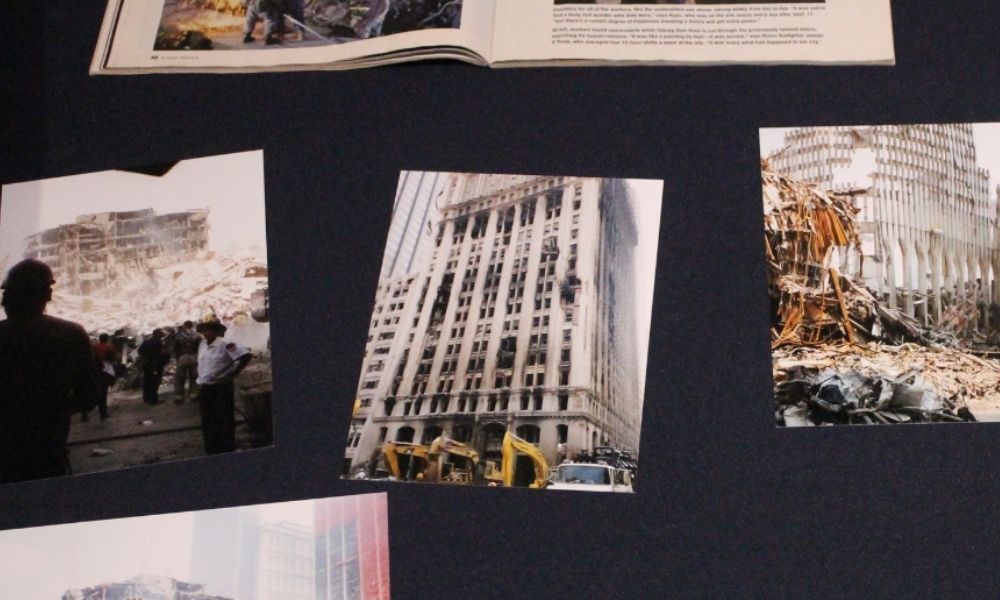Sept. 11, 2001 (also referred to as 9/11) marks a dark day in history across the globe. Many can recall exactly where they were when they heard the news of the four terrorist attacks that resulted in more than 3,000 lives lost on American soil.
In memory of the 20th anniversary of 9/11, Newman students wrote thank you letters to 911 responders in Wichita during Jet Friday on Sept. 10. Campus Ministry also offered a noon Mass for all lives lost and affected by the attacks of 9/11 in St. John’s Chapel.
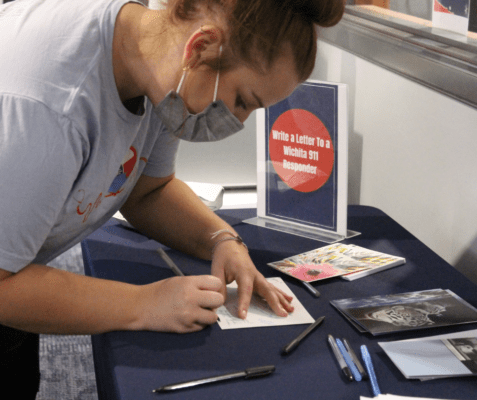
The events of 9/11 had an impact on countless individuals. Today we share the reflections of two Newman faculty and staff members.
Kristi Barton Edwards, assistant professor of criminal justice
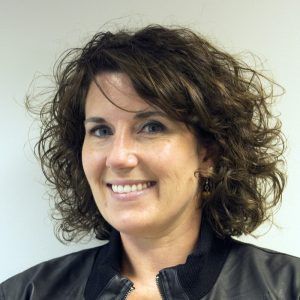
At 8 a.m. Sept. 11, 2001, Kristi Barton Edwards was running late for her Constitutional Law class during her final semester at the University of Kansas. As she turned on her car radio and drove to campus, Edwards heard a report on the first of two attacks on the twin towers and thought it must have been a hoax.
“As soon as I got to class, the professor turned on the news and we watched the second tower get hit,” Edwards said. “My professor was from New York, so he was holding his breath and furiously trying to contact friends and family who were there.”
For the rest of the week, Edwards’ classes were canceled. Many students left campus to spend time with their family and friends — Edwards included. As she continued to watch the coverage of law enforcement, firefighters and others saving lives and handling the chaos, Edwards felt called to help in those efforts.
“My professor was from New York, so he was holding his breath and furiously trying to contact friends and family who were there.”
— Kristi Barton Edwards, assistant professor of criminal justice
“It became crystal clear to me that I wanted to be part of the changes that were coming for how we live and feel safe in the U.S.,” she said. “The experience solidified my decision to work as a prosecutor in my hometown in Sedgwick County, Kansas, and to find ways to provide training and support to law enforcement officers.”
A career-solidifying impact
Though 20 years have passed, Edwards remembers the day’s events as if they happened yesterday.
“The collective consciousness of law enforcement was altered forever on 9/11. I cannot emphasize enough how many aspects of our lives changed that day. I remember flying before 9/11, how easy it was to get into an airport, or in and out of government buildings without a weapons check. Truly, there are so many parts of life that were privileges and we took it all for granted.”
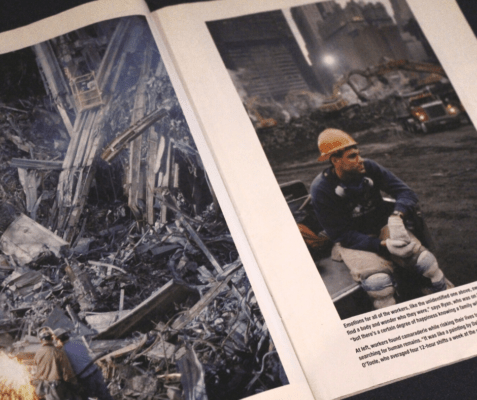
Edwards added, “As a profession, the mentality shifted from keeping the peace to protecting all of us from terrorism. With this in mind, I find it incredibly frustrating when anyone attacks law enforcement, or blames law enforcement, for its response to disorder and chaos.”
Edwards defines 9/11 as a “truly terrible, horrible, no good day.”
“And it really did have an immediate impact on my decision to dedicate my life to working with law enforcement,” she said.
Morris “Mo” Floyd, director of security
For Mo Floyd, Sept. 11, 2001 is a day he will always remember.
“I’ll add it to the day we landed on the moon, the day Elvis died, the day when President Regan was shot and the Oklahoma City bombing. Unlike the other events listed, 9/11 was not a singular event; it was multiple events in multiple locations that unfolded throughout the day.”
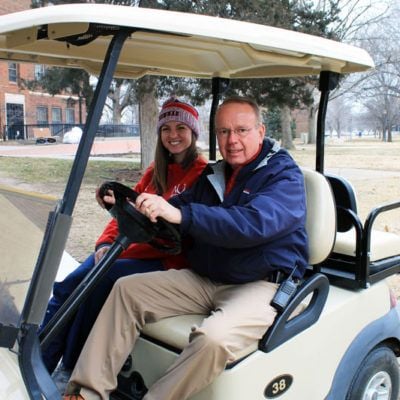
Floyd recalls listening to the radio as he drove to the city building in downtown Wichita, where he worked in the Crime Prevention Unit of the Wichita Police Department. A deejay named Cornbread on the KFDI radio station offhandedly mentioned a news story about an airplane crashing into one of the World Trade Center buildings.
“He then continued with his normal humorous nonsense and played some music,” Floyd said. “I hopped over on 31st Street South to McLean and turned north. As I was passing Watson Park on McLean, Cornbread came on the radio and said that a second plane had just crashed into the World Trade Center. I remember saying out loud to myself, ‘That’s an act of terrorism.’”
As news stories broadcasted fast and furiously, Floyd said it was difficult to tell what was true and what wasn’t.
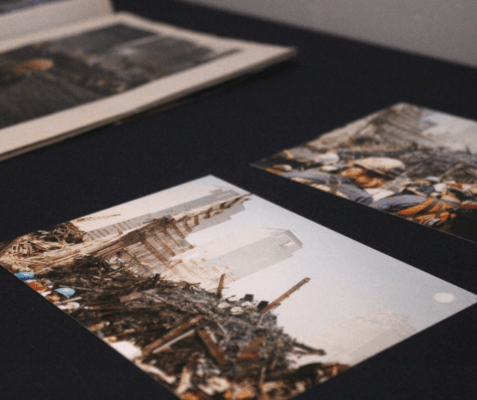
Floyd arrived at work, called his wife to tell her to turn on the news, then went into his lieutenant’s office across the hall and watched the TV. The news revealed that in addition to the two planes crashing into the World Trade Center, Flight 93 crashed into a field outside of Shanksville, Pennsylvania, and another flight crashed into the Pentagon.
“I remember the Federal Aviation Administration ordering all aircraft to land at the nearest airport,” Floyd said. “I looked out of my fourth-floor office window and watched dozens of airplanes circling overhead, waiting for their turn to land at the Wichita airport.
“That sight told me this was all very real.”
Remembering 9/11
Floyd shared that individuals may not remember an earlier attack on the twin towers that occurred Feb. 16, 1993 when a truck bomb underneath the towers killed six people when it detonated in the parking garage.
“I looked out of my fourth-floor office window and watched dozens of airplanes circling overhead, waiting for their turn to land at the Wichita airport.
That sight told me this was all very real.”
Morris “Mo” Floyd, director of campus security
“I remember feeling helpless, wanting to do something, anything. As the days passed I couldn’t donate blood as the line to donate was out the door and around the building. Food pantries were turning away donations as they had run out of room to store them. It seemed everyone was flying an American flag. Churches were full every Sunday for the next few months.”
In Floyd’s 27 years of work with the police department, he said 9/11 was the only day there was absolutely no police radio traffic.
“The other big memory that sticks out to me from that day is that my lieutenant, whose office I watched the towers come down in, was a Muslim and he was as appalled as I was at what he was seeing,” Floyd said. “I was honored to share the day with him.”
Floyd encourages everyone to watch the YouTube video “Boatlift — An Untold Tale of 9/11 Resilience,” narrated by Tom Hanks.
“It shows just what we Americans are made of and the courage of the common man,” Floyd said.

